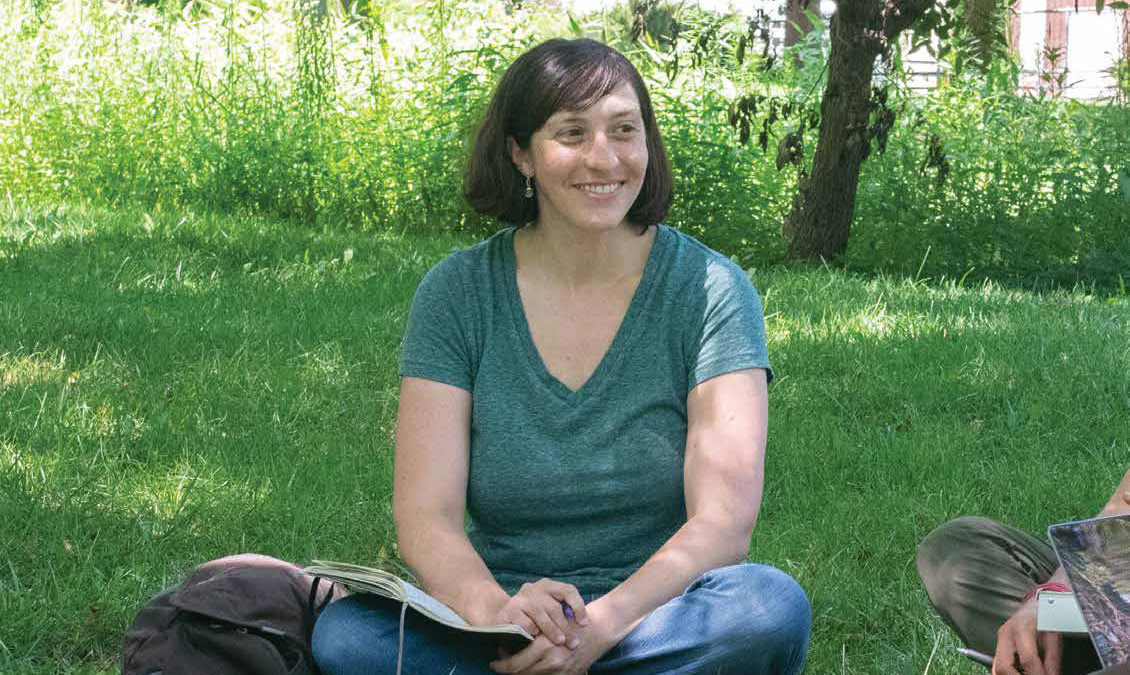
Nebraska One Health
A Holistic Approach to a Healthy Nebraska

Human health, animal health and environmental health are all interconnected, and this interdependence impacts the health of an entire ecosystem. Nebraska One Health at the University of Nebraska–Lincoln aims to increase awareness of these connections and works with diverse partners to enhance health.
“We live in an interconnected world where there are really strong links between the health of people, animals, plants and our shared environments. One Health recognizes those links and brings together different disciplines and stakeholder groups like universities, government agencies, nonprofit organizations and communities to address health challenges that affect people, animals and ecosystems,” said Elizabeth VanWormer, Nebraska One Health coordinator and assistant professor in the School of Veterinary Medicine and Biomedical Sciences and the School of Natural Resources at the university. “It's really about bringing together diverse teams and perspectives.”
As a trained veterinarian and epidemiologist, VanWormer looked to find ways to merge her interests.
“Instead of working as a veterinarian or an epidemiologist alone, I am able to work as part of a diverse team through a One Health approach. Building more holistic teams to look at complex challenges like disease transmission is the ultimate goal,” VanWormer said. “One Health is a holistic approach to health.”
VanWormer said one example of the One Health approach is to think of an emerging disease moving from wildlife to people or appearing in a new area in the world. Looking at these issues as connected, rather than individually, may help to find better solutions.
Nebraska One Health not only shares online resources, but also offers grant opportunities and holds regular meetings for those who are interested in becoming involved. Find out more at https://nebraskaonehealth.unl.edu.
The One Health Approach
The One Health approach is growing globally, according to VanWormer. Many One Health programs and research projects have been implemented in the US and around the world, and Nebraska One Health is the program in the state of Nebraska.
“There’s been a growing appreciation for the value of bringing together different groups to look at the health of people, animals and the environment,” VanWormer said.
One Health is more than a health resource. VanWormer said it also “provides an approach for bringing unique ideas together.”
For example, when we think about the health of people and animals and their shared environments, a One Health approach might include teams that not only involve medical professionals and researchers, but also people who focus on climate science, hydrology, and land-use change, VanWormer said.
There is also a need for team members from social sciences, such as economics or anthropology. She said the One Health approach needs people who are good at communicating about health, including storytellers and artists.
The One Health approach is not new, but the topic has become more of a focus in recent years, VanWormer said. Human populations are growing; changes are occurring in the environment; and international travel has increased, causing humans and animals to have more contact than ever before.
Because animals and humans are both susceptible to diseases and environmental hazards, animals can serve as early warning signs for human health concerns.
Nebraska’s One Health Issues
VanWormer sees the One Health approach as giving groups in Nebraska the opportunity to think more creatively about how we can improve the health of people, pets, livestock, wildlife, and our shared environments.
Formed in 2016, the program at the university is fairly new and is still working on implementing the practices of the One Health Approach on a statewide level. In addition to links with researchers at the University of Nebraska–Medical Center, University of Nebraska–Omaha, University of Nebraska–Kearney, Creighton University and Doane University, Nebraska One Health is building collaborations with individuals at United States Department of Agriculture, Nebraska state agencies, and organizations such as the Henry Doorly Zoo in Omaha, Nebraska and The Nature Conservancy.
According to VanWormer, those involved with implementing these practices are thinking about the best ways to build partnerships across the state. She hopes these partnerships will be able to address some of the big challenges affecting the holistic health of Nebraska, such as water quality and quantity, antimicrobial resistance and zoonotic diseases (diseases shared by people and animals).
“With livelihoods in Nebraska being largely involved in and impacted by agriculture, challenges such as water use, water contamination and runoff and land conservation are important in our state,” VanWormer said.
Water is always identified as one of the key One Health issues in Nebraska, VanWormer said. Having the conversation about water and trying to work together to develop effective practices for water has the potential to not only keep agriculture strong, but also to keep the natural resources protected.
“When one discipline thinks about the challenge of contaminated water runoff, they might turn to the standard practices within their field,” VanWormer said. However, when there are many people at the table thinking from diverse perspectives, there might be more integrated ways to approach the issue and measure it, she said.
For instance, “we could think about contaminated water just from the chemical perspective, but we could also think about pathogens running off from animals, either livestock, pets or wildlife,” VanWormer said. “By bringing together these teams, we’ll be able to think deeply about the challenge and how to most effectively address it for the benefit of health for all.”
According to VanWormer, antimicrobial resistance and zoonotic diseases also are important concerns in Nebraska. Zoonotic diseases are diseases that can be shared between humans and animals. Some examples of these diseases include avian influenza, rabies and the West Nile Virus.
VanWormer said a future goal of Nebraska One Health is to build more connections with communities, farmers and ranchers, and wildlife and landscape managers.
“People who are out in the environment every day are often the first people to see signs of change,” VanWormer said. “They have a strong connection to the land and we truly appreciate having them join the conversation.”
Creating teams with diverse perspectives will help to identify and implement new solutions to protect the health of people, animals, and ecosystems.